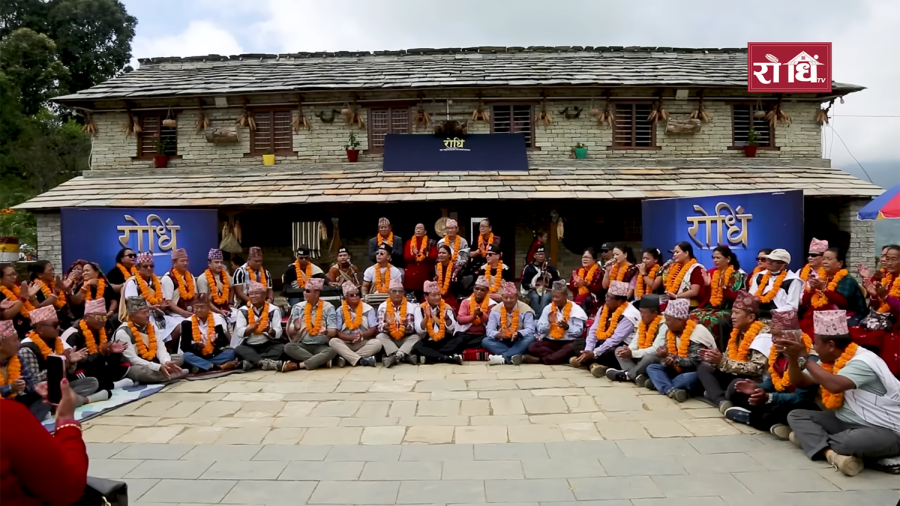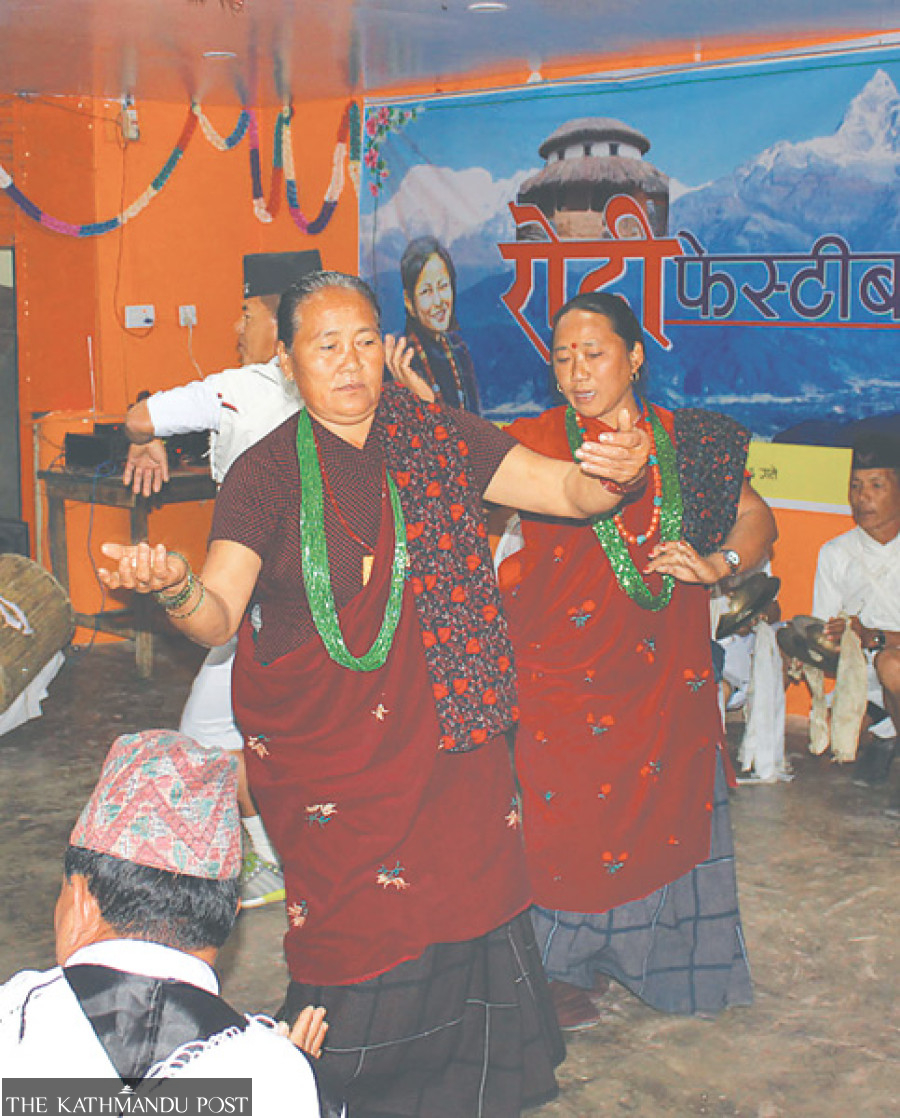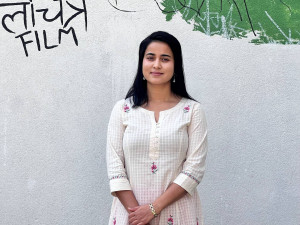Culture & Lifestyle
Rodhi culture at the crossroads
As traditions evolve, community voices reflect on Rodhi’s fading essence. Once a space of song, solidarity, and shared wisdom, it is now at risk of being misrepresented and forgotten.
Reeva Khanal
Culture is not just a collection of customs—it is the living thread that weaves generations together. It carries the essence of who we are, where we come from, and how we relate. Through stories, rituals, and practices passed down over time, culture holds the wisdom of the past and the values that guide our present. As time moves forward, change is inevitable—and even necessary. We evolve, adapt, and grow. But in that process, we must ask: what do we hold on to, and what do we let go of?
One such cultural practice at the heart of Nepali identity is Rodhi—a traditional communal expression rooted in the Gurung community. At its core lies the Rodhi Ghar, a designated space where people, especially young men and women, would gather to sing, dance, exchange riddles, and form lasting social bonds. These gatherings were not merely about entertainment—they were spaces of learning, belonging, and cultural continuity. Through lok dohori (folk duets) and shared laughter, generations found their voice and passed on their values.
Our sense of community is often built and sustained through such cultural spaces. From learning how to communicate respectfully to understanding the role of harmony in collective living, much of what shapes our social identity stems from these traditions. As elders say, we do not just inherit land or names from our ancestors—we inherit their songs, stories, and wisdom. And it is through practices like Rodhi that these intangible inheritances come alive.
Lina Gurung, assistant professor at Kathmandu University School of Education, currently coordinates the Master’s programme in Indigenous Education and Development. She is involved in researching and reviving cultural practices that are at risk of fading away. Through indigenous education research, she works to preserve and reintroduce traditional knowledge systems that have long shaped Nepal’s cultural identity. Gurung views Rodhi not merely as a performance, but as a grassroots cultural practice central to the Gurung community’s way of life. “Rodhi is not just about singing and dancing—it is about connection, sharing, and learning,” she explains. “Elders passed on agricultural knowledge, divided responsibilities, and guided young people on how to live, behave, and cooperate. It was a space for skill transfer, community coordination, and social orientation—all woven into one tradition.”
According to her, Rodhi played a significant role in shaping identity and fostering a sense of belonging. “It was a space to understand ourselves and each other. Through Rodhi, we built emotional bonds, shared responsibility, and created collective memories,” she adds.
However, she expresses concern about the way Rodhi is being perceived and practised today. “The essence of Rodhi has been lost in many places. People are using its name in the wrong context—reducing it to vulgarity and misusing it in clubs or urban setups that bear no connection to its original purpose,” she notes. “Rodhi has now been portrayed negatively, as though it’s just about late-night entertainment, when in reality, it is a deeply respectful and meaningful space for the Gurung community.”
She believes that urgent action is necessary to address this distortion. “Those misusing the name of Rodhi should be held accountable. There needs to be stricter guidelines when clubs or organisations register under cultural labels—the government must assess their impact on the community,” she says.“The lack of awareness and implementation is why people think they can do whatever they want. But if we wish to protect this cultural treasure for the next generation, we must take meaningful steps now.”
Culture and language activist Buddhilal Maharjan echoes this sentiment, noting that Rodhi culture has been noticeably reshaped by modern influences. “Rodhi, like many traditions, has been modified by the new generation—heavily influenced by films, Facebook, and other social media platforms,” he shares. “People seem to be forgetting their direction; they have lost their way.”
Maharjan has been actively involved in cultural preservation efforts and feels that every ethnic group in Nepal must take ownership of their traditions. “I am committed to safeguarding our cultural practices—and I believe every community should do the same,” he adds. “Preserving culture isn’t the duty of one or two activists alone—it’s a collective responsibility.”
He admits it has been a long time since he last witnessed a Rodhi gathering firsthand, and that most of what he knows comes from secondary sources—movies, newspapers, and old photographs. Yet, he notes a visible imbalance not just within Rodhi, but across several cultural practices in Nepal. “The younger generation must study, research, and understand these traditions—because only through understanding can we protect them,” he rem

arks. “If we remain disconnected, our cultural legacy may fade silently.”
Rakesh Gurung, a member of Tamu Hyula Chhonj Dheen Gurung Rastriya Parisad, reflects on the shifting dynamics of Rodhi culture and the vacuum left by youth migration. “Even in the villages now, it’s hard to find young people,” he says. “That’s why traditions like Rodhi are slowly disappearing. There’s no sustainable way to earn money, and people are leaving—so the cultural fabric is thinning.”
He expresses concern over how Rodhi has been commercially appropriated, especially in urban centres like Kathmandu. “Most so-called Rodhi Ghars or clubs in the cities are not run by people rooted in tradition. They are run by investors who may not even understand what Rodhi truly means,” he adds. “They’re using the name to earn money—selling the Gurung identity for profit.”
Recalling its roots, he describes Rodhi as a sanctuary of peace and planning, deeply linked to Nepal’s agricultural heritage. “After a full day of work in the fields, people would gather at the Rodhi Ghar—to rest, talk, share joys and sorrows, and plan for tomorrow,” he explains. “It isn’t just for entertainment—it is about connection, preparing for agricultural tasks, and belonging. That essence is missing now.”
Though many of us remain connected to Nepal’s roots, the pace of modernisation has brought about a growing sense of disconnection over time. Nepal is known for its rich tapestry of traditions, yet the voices we’ve heard echo a collective worry—we are losing the essence that once bound us together. It’s natural, even necessary, to move forward, to modernise our thinking and adapt with time. But that growth need not come at the cost of our heritage.
Rodhi is not just a practice—it is a feeling, a space to gather, speak, listen, and belong. Today, we find ourselves increasingly isolated, with fewer shared spaces and fewer moments of learning and teaching across generations. There is an urgent need for action—not just from organisations or the government but from individuals within the community.




 15.12°C Kathmandu
15.12°C Kathmandu















